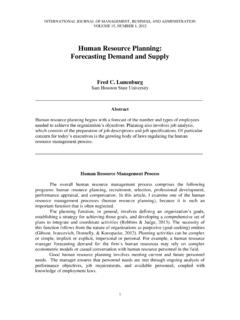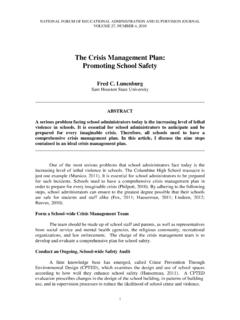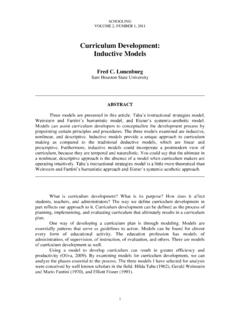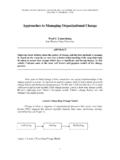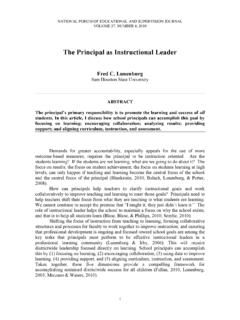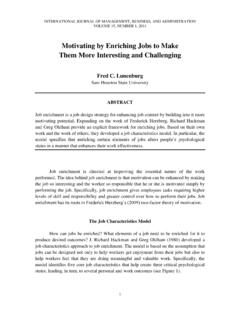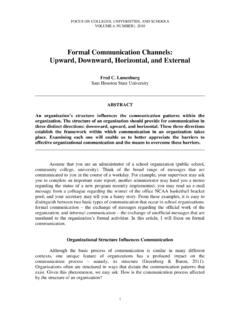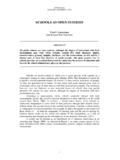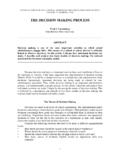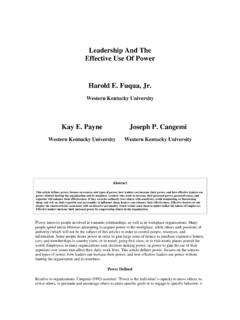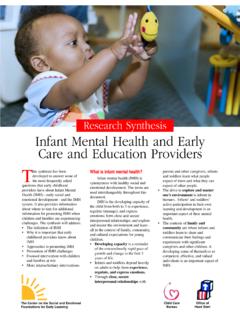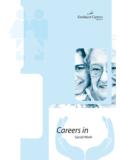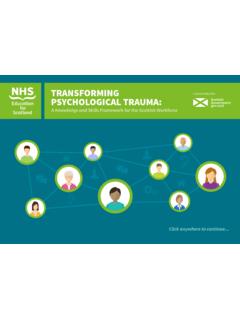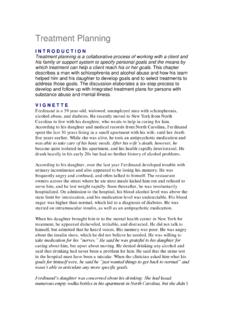Transcription of Psycho-Educational Groups in Schools: The …
1 NATIONAL FORUM JOURNAL OF COUNSELING AND ADDICTION VOLUME 2, NUMBER 1, 2013 1 Psycho-Educational Groups in Schools: The Intervention of Choice Samuel K. Bore, PhD Assistant Professor of Counseling Department of Psychology and Counseling Tarleton State University Stephenville, Texas LaVelle Hendricks, EdD Assistant Professor of Counseling Department of Psychology, Counseling, and Special Education Texas A&M University-Commerce Commerce, Texas Ashley Womack, MS Doctoral Candidate Department of Psychology, Counseling, and Special Education Texas A&M University-Commerce Commerce, Texas _____ Abstract While school counselors are expected to serve all students.
2 They have myriad responsibilities and are pressed with time to provide one-on-one counseling to all students. Adapting group work as the treatment of choice could remedy this problem-it is not only an economical use of counselors limited time, but also therapeutic to students. This article discusses several topics that can be addressed in Psycho-Educational Groups including social skills development, emotional issues, sexual issues, stress management, study skills , and diversity. Keywords: Psycho-Educational Groups , school counselors, intervention, choice, efficient _____ school counselors are an essential part of school children s success (Dahir, Burnham, & Stone, 2009).
3 As school counselor responsibilities grow, time for one-on-one counseling sessions with children has decreased. In addition to providing counseling services to students, school counselors are often responsible for such duties as computing grade-point averages, maintaining student records, administering tests, registering students for classes (Perusse, Goodnough, & Lee, 2009) consulting with parents, and facilitating meetings. With a heavy load of administrative responsibilities coupled with high counselor student ratios, it is often difficult for school counselors to justify and/or find time for individual sessions with students in need.
4 To assuage this situation, school counselors can utilize group work to reach and serve multiple students simultaneously. NATIONAL FORUM JOURNAL OF COUNSELING AND ADDICTION 2_____ group Work in Schools group work has merit and is beneficial in many settings especially schools (Johnson & Johnson, 2005). It is not only time saving for a school counselor (Bore, Armstrong, & Womack, 2010), but also therapeutic for children. Many children that need therapeutic intervention are unlikely to receive it unless in a school setting (Dore, Nelson-Zlupko, & Kaufmann, 1999; Rice & Meyer, 1994).
5 In fact, schools are the sole institutions with a significant and sustained access to children and adolescents (Rice & Meyer, 1994, p. 145) and are conducive environments for peer-to-peer interactions. Peer-to-peer interactions in Groups allow students to observe and learn from each other in a controlled therapeutic environment (Sayder, 2008; Van Velsor, 2009). This environment is analogous to everyday peer relationships in such settings as church, sports, and committee meetings (Akos, Hamm, Mack, & Dunaway, 2007). Accordingly, their familiarity create a nonthreatening environment wherein students can express their concerns and feelings, learn to solve problems, and gain insight via peer interaction and constructive feedback.
6 In addition, Groups are favorable settings to enhance students academic, social , and physical growth and development. For these to be realized, however, school counselors must undergo a major paradigm shift whereby group counseling becomes the intervention of choice rather than individual counseling (Bemak, Chung, & Siroskey-Sabdo, 2005, p. 379) and begin to appreciate that group work is no longer second best or cheap or diluted treatment compared to individual therapy (Barlow, 2008, p. 241). In fact, as Parcover, Dunto, Gehlert, and Mitchell (2006) discovered, group work is therapeutically beneficial and 25% more effective than individual counseling.
7 Consequently, it should be embraced as a powerful intervention in schools. With its wide array of applications, group work in schools is an essential service that counselors can utilize to address students academic, social , and emotional concerns (Akos et al., 2007). Given that most Groups have specific goals and consist of a few students, usually 6-10, who meet regularly in confidential sessions, group members not only support each other, but are also able to collectively handle myriad issues. The small number in Groups makes it easier for confidentiality, a prerequisite for any meaningful work, to be established and maintained.
8 Unlike individual counseling, confidentiality in group settings is not only harder to establish and maintain; it is easily broken (Van Velsor, 2004). Given that group members growth is elusive without confidentiality and trust (Berg, Landreth, & Fall, 2006); group leaders must make concerted efforts to encourage members to respect each other by remaining confidential. Psycho-Educational group Work There are typically four types of Groups : task, Psycho-Educational , counseling, and psychotherapy (Barlow, 2008; Bore et al., 2010). While detailed differences may not exist between these types of Groups , each has recognizable characteristics with professional utility (Association for Specialists in group Work [ASGW], 2000).
9 Of the four types, Psycho-Educational is commonly utilized in comprehensive school counseling programs (Geroski & Kraus, 2002). It is suitable for well-functioning individuals who may have some information shortfall in some areas (Corey & Corey, 2006). Consequently, the focus is to teach, discuss, SAMUEL K. BORE, LAVELLE HENDRICKS, AND ASHLEY WOMACK _____3 orient, and cause an examination of member attitudes, values, beliefs, ideas, and opinions (Rivera, Wilbur, Phan, Garrett, & Betz, 2004). In Psycho-Educational Groups , new knowledge and skills are acquired through the use of designed skill-building activities (Gerrity & DeLucia-Waack, 2007).
10 Psycho-Educational Groups have historical roots in the field of guidance and continue in their popularity today (Geroski & Kraus, 2002). school counselors have widely utilized them to focus on skill acquisition for preventive and interventional purposes across grade levels. For instance, school counselors have successfully conducted Groups to promote coping skills and self-esteem with preschoolers (Kenny, 2009), grade school children (Dore et al., 1999), middle school children (Schechtman & Ifargan, 2009), and high school students (Dowden, 2009).
